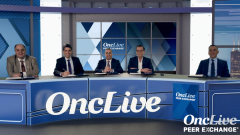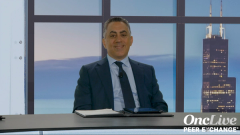
Patient Profile 3: Second-Line Therapy for Advanced HCC
Centering discussion on a patient with advanced HCC, expert oncologists consider which agents they would use in the second line following lenvatinib failure.
Episodes in this series

Transcript:
Tanios Bekaii-Saab, MD: Doctor Yarchoan, please present patient profile 3 with slides.
Mark Yarchoan, MD: Patient number 3 is a 63-year-old woman with a medical history of chronic hepatitis C and Crohn disease. This patient presented with a 22-pound weight loss, and the CT showed a 10.5-centimeter liver mass with a portal vein invasion. The radiologist read this as a LI-RADS [liver imaging reporting and data system] 5 lesion. The patient had a normal bilirubin [level]; AST [aspartate aminotransferase] was elevated at 271; ALP [alkaline phosphatase] was elevated at 7.98; albumin was normal at 4.3; platelets were 43,000; and the AFP [alpha-fetoprotein] was markedly elevated at 41,000. The patient's Child-Pugh score was A5, and based on the LI-RADS criteria, this patient has hepatocellular carcinoma. The patient was treated with lenvatinib up front, initially 12.5 milligrams daily. The patient developed grade 4 hypertension and fatigue, and despite some dose modifications, lenvatinib was discontinued due to persistent adverse events. The restaging scan 9 months after initial presentation showed new lung metastasis, and the AFP rose to 65,000. And we can discuss.
Tanios Bekaii-Saab, MD: A very interesting case. So: Crohn disease, high AFP, started with lenvatinib and now progressed. Mark, I'm going to start with you. How would you treat this patient? How would you think about your next option for this patient?
Mark Yarchoan, MD: We're missing some details about the Crohn disease: how active it is.
Tanios Bekaii-Saab, MD: Let's say it's active and treated; under relative control, but few bowel movements a day.
Mark Yarchoan, MD: We have several options after first-line TKIs [tyrosine kinase inhibitors], including cabozantinib, regorafenib, and ramucirumab as well as checkpoint inhibitors pembrolizumab, ipilimumab, or nivolumab. The only agent I wouldn't use in this patient is the ipilimumab-containing regimen because it is associated with colitis, and that would be problematic here. Overall, the hazard ratio for survival is not that dissimilar from the other agents discussed. I would probably go with some sort of VEGF agent and—in this case, given the poor tolerability of lenvatinib—ramucirumab, which does not have those TKI adverse effects, may be a compelling option.
Tanios Bekaii-Saab, MD: Arndt, would you give ramucirumab for a patient who's had lenvatinib failure?
Arndt Vogel, MD: Yes, this is something we can consider in this case because the AFP was high, and we have seen the REACH studies. The REACH study [NCT02999087] was negative, but there was a signal that patients with a high AFP have survival benefit. Then the REACH2 study [NCT0291326] was published with disappointing results because the different median overall survival was only moderate. I agree that the toxicity profile is different from TKIs, and for those patients that do not tolerate TKIs, it's an interesting option. The question is: what should we do in patients that have been treated with lenvatinib or atezo/bev [atezolizumab bevacizumab] or any other drug in combination, except for sorafenib in the second line?
Tanios Bekaii-Saab, MD: Let's stick to lenvatinib right now.
Arndt Vogel, MD: After lenvatinib, it depends on region. In my country I would only be allowed to use sorafenib because only sorafenib can be used independently of the treatment line. If I could decide by myself, I would think about atezo/bev, I mean today; it has not been used before.
Tanios Bekaii-Saab, MD: This patient has active Crohn disease.
Arndt Vogel, MD: We need to be careful, I agree. The other point would be ramucirumab, for those patients with fatigue and hypertension, that would certainly be an option.
Transcript edited for clarity.








































